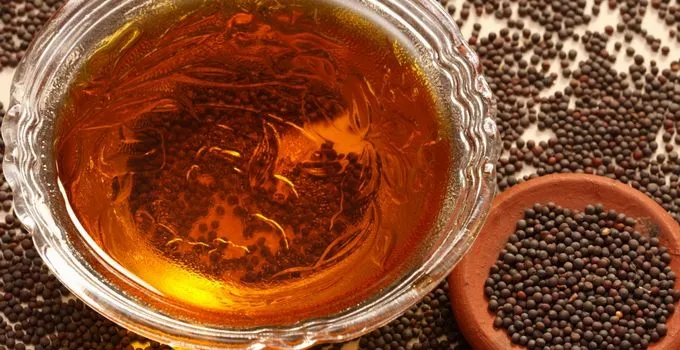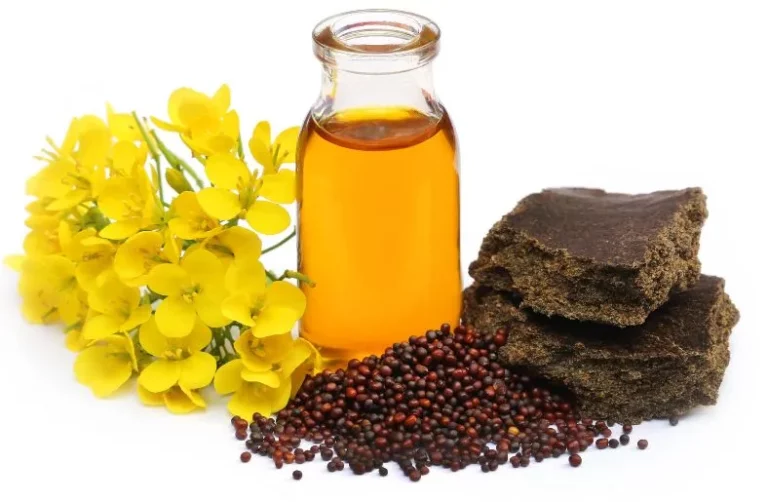Looking for a new lubricant? Why not try something a little out of the ordinary and go for mustard oil? can we use mustard oil as lubricant? It might sound strange, but this pantry staple can actually be quite effective when it comes to getting things slippery. Plus, it’s all natural so you can feel good about using it. Just be sure to test it out on a small area first to make sure there’s no adverse reaction.
Article Navigation
What is Mustard oil?
Mustard oil is an oil made from the seeds of the mustard plant. The mustard plant is a plant in the family of Brassicaceae, which also includes cabbages, broccoli, and other vegetables. The oil is made by pressing or grinding the mustard seeds to release their oils.
Mustard oil has a strong, pungent flavor and is used in Indian cooking. It is popular in many Asian countries, especially India, as a cooking oil. It is also a popular salad dressing ingredient in many parts of the world. Mustard oil is high in fatty acids, which makes it a good lubricant. It is also a natural antifungal and antibacterial agent.
Can we use Mustard oil as a Lubricant? If yes, then what are the Benefits?
Despite its many uses, mustard oil is rarely used as a lubricant due to its pungent taste. However, it is still used in some countries as a cheap lubricant for mechanical or physical tasks due to its lightweight and natural lubrication properties.
In these situations, people often use mustard oil as a replacement for petroleum jelly (Vaseline). Because it has similar properties but a much weaker smell which makes it much more pleasant to use mustard oil makes an excellent lubricant for personal use.
Some people even avoid eating Indian food because of the strong taste of mustard oil. However, many culinary uses exist for mustard oil, including as a lubricant.
Aside from culinary uses, many users apply mustard oil externally for medicinal purposes. For example, people often use mustard oil as a remedy for minor aches and pains due to its warming effect. Its heating effect can also cause slight nausea so this use should be reserved for external application only when necessary.
In addition, some people use mustard oil as an eye drop during cold or sinus symptoms due to its mild diuretic effect. They then apply the drops externally to relieve nasal congestion due to the oily smell that attracts nasal congestion in the first place.
According to traditional medicine, mustard oil has strong antibacterial properties. This property contributes to its use as a locally applied ointment or massage lotion due to its ability to relieve skin infections.
Overall, mustard oil has many benefits that make it an ideal choice for use as a lubricant. It is non-toxic, biodegradable, and has a high flash point, which makes it less likely to catch fire. Mustard oil also has anti-bacterial properties, which can help to prevent infection in wounds.
Mustard oil can be used as a lubricant, but it is not advisable to use it on sensitive body parts or areas with broken skin. It can cause irritation and may even lead to infections. If you do choose to use mustard oil as a lubricant, be sure to patch-test it on a small area of the skin first to check for any adverse reactions.

Are there any drawbacks to using mustard oil as a lubricant?
Although mustard oil has a number of benefits as a lubricant, there are also some drawbacks to using it.
- Mustard oil is not very stable, meaning that it can break down quickly. This makes it less effective as a lubricant and can even cause damage to some materials.
- Mustard oil is also not very moisture-resistant. This means that it can be washed away easily by water, making it less effective in wet conditions.
- Finally, mustard oil can be quite smelly. This may not be an issue for some people, but it could be a problem if you are trying to avoid attracting attention to your activities.
How to use mustard oil as a lubricant?
Mustard oil has a number of benefits that make it ideal for use as a lubricant. It is high in mono-saturated fatty acids, which help to reduce cholesterol and keep the heart healthy. In addition, mustard oil is a powerful anti-inflammatory agent, making it ideal for use in a massage.
To use mustard oil as a lubricant, simply apply it to the area you wish to massage. Mustard oil can be applied directly to the skin or mixed with other oils such as coconut oil. For a more relaxing experience, add a few drops of lavender oil to the mixture.
How to store mustard oil?
Mustard oil can be stored in a number of ways, but the best way to store it is in an airtight container in a cool, dark place. You can also keep it in the refrigerator, but it will become solid at cold temperatures.
What is the shelf life of mustard oil?
Mustard oil has a strong, pungent flavor and is used as a cooking oil in many parts of the world. It is also sometimes used as a lubricant, although there is some debate about its safety for this purpose. Mustard oil does have a relatively long shelf life, but it will eventually go bad.
Mustard oil will last for about 1-2 years when stored properly. It should be kept in a cool, dark place in an airtight container. Once opened, it is best to use the mustard oil within 6 months. After that, it will start to lose flavor and develop off-flavors.
Related Guide: Explained: Can you Use Vaseline as Bike Grease (2023 – 2024)? [Expert Opinion]
How to dispose of mustard oil?
While mustard oil has many uses, it can also be difficult to dispose of properly. We will provide some tips on how to dispose of mustard oil properly.
The first thing you need to do is to make sure that the mustard oil is no longer usable. If it is still good, you can donate it to a local food bank or soup kitchen.
If the mustard oil is no longer good for consumption, you will need to dispose of it in a way that will not harm the environment. One way you can do this is by using it as a biofuel.
You can also compost the mustard oil or use it as an industrial lubricant. If you have any questions about how to dispose of mustard oil properly, you should contact your local waste management company for more information.
Frequently Asked Questions
Here are answers to some frequently asked questions about mustard oil:
1. Can mustard oil be used as a lubricant?
Yes, mustard oil can be used as a lubricant. In fact, it has been used as a lubricant for centuries. Mustard oil is an effective lubricant because it is high in monounsaturated fatty acids, which reduce friction. Additionally, mustard oil has a high smoke point, so it can withstand high temperatures without breaking down.
2. Is mustard oil a good cooking oil?
Mustard oil is a good cooking oil because it is high in monounsaturated fatty acids and has a high smoke point. Additionally, mustard oil imparts a characteristic flavor to food that many people enjoy.
3. Can mustard oil be used in hair products?
Mustard oil can be used in hair products to moisturize and condition the hair. Additionally, the fatty acids in mustard oil can help to protect the hair from damage.
4. Can we use mustard oil for breast massage?
By massaging your breasts twice daily, you can increase blood circulation in your body. The flow of hormones increases their size as a result. The use of cod liver oil or mustard oil for massage is recommended.
5. Does mustard oil darken skin?
Our tans are reduced, dark spots are lightened, and hyperpigmentation is controlled through mustard oil, which is rich in vitamins. Additionally, it prevents tanning and protects your face from harmful UV rays.
6. Which is better mustard oil or coconut oil?
For people living in the Southern part of India, coconut oil is better while for those living in North India mustard oil is a better choice. This is because South India has ample amounts of coconut and therefore the natives of southern India should consume it because it suits their body metabolism.
7. Is mustard oil hot or cold for the body?
Mustard oil has Kapha-balancing and Ushna (hot) properties, according to Ayurveda. When applied externally on the chest and back, these properties reduce cold symptoms.
8. Does mustard oil whiten teeth?
Natural whiteners are made from toothpaste that’s been mixed with salt and applied to teeth. A mixture of one part salt to three parts mustard oil is all you need. So, if you are taking one teaspoon of salt, use three teaspoons of mustard oil, and rub it on your teeth for a few minutes.
Conclusion
Mustard oil has a pungent taste and thick consistency and is primarily derived from mustard seeds. It is widely used in Indian cuisine and as a hair care product. Although many health benefits exist for using mustard oil, using it as a lubricant remains uncommon due to its pungent taste.
Mustard oil can also be used as a massage oil, hair oil, and body oil. It has a number of health benefits including being effective in relieving muscle pain, improving digestion, and reducing inflammation.
However, many users have found various uses for this unique cooking ingredient including as an anti-bacterial ointment and as an eye drop during nasal congestion. Therefore, given time, perhaps one day we’ll see the world embrace the ‘mustard seed’ in new ways!


